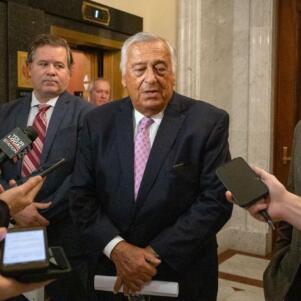Was Baker’s $2,000-Per-Business Health Care Penalty A Red Herring?
By Andrew C. Nelson | April 12, 2017, 7:36 EDT

Governor Charlie Baker’s plan to impose a hefty fine on businesses that have 11 or more workers and do not provide health care coverage is still alive officially, but the sting may be in the process of being taken out of the proposal.
Still, some sort of penalty to those businesses is probably coming, say observers.
The Massachusetts House of Representatives’ Ways and Means Committee left the framework for the fines in place in the budget that it submitted unanimously to the full house this week, but instead of leaving in Baker’s original $2,000-per-employee “assessment,” the amount is now undetermined in the budget submitted to the full house, and the plan will be delayed until the idea is reviewed further by Baker’s Department of Revenue.
Baker’s original plan “was a bit of a red herring,” said Wendy Northcross, chief executive officer of the Cape Cod Chamber of Commerce. “It’s a standard political tactic to propose a dramatic fine and then come in with a lower rate that feels more palatable. He has been quite adept at that.”
Northcross noted that the governor and his staff have met with the Cape Cod Chamber of Commerce and other state business groups, and she said it is her understanding that the governor will eventually support a modified plan.
“He’s been working behind the scenes with some large business groups, who have expressed opposition, and he’s responded with ‘let’s have a conversation about it, then’,” Northcross said in a telephone interview Tuesday.
A spokesman for another Boston-based business advocate group said on background that the penalty for not providing health insurance still needs to be watched closely, but that it could be months before the administration sets any final parameters and actually begins fining businesses.
Massachusetts’s original health care act, which became law in 2006, assessed a $295 penalty per employee on businesses with 10 or more full-time employees that did not provide health insurance to them. But that penalty was repealed in 2013 after the passage of the federal Affordable Care Act (known as Obamacare), which set a national requirement that businesses with 50 or more employees must provide health care coverage.
Obamacare injected federal funds that allowed the state to expand MassHealth (the state’s version of Medicaid) to anyone making less than 138 percent of poverty level. MassHealth now covers about 1.9 million people, according to state records released earlier this year. The state currently is spending more than 40 percent of its budget on MassHealth, and Baker has said some of those people should be getting health insurance from their small-business employers.
But one observer says the Baker administration has it wrong. Stephen Clark, of the Massachusetts Restaurant Association, argues that businesses aren’t shying away from offering health insurance, and in many cases are paying extremely high premiums. He says many employees are simply signing up for the state’s Medicaid option by choice, which the state allows them to do.
“In many cases it is out of the employer’s hands, as employers can’t require employees to take insurance. If the State is going to offer a better deal, well of course the employee is going to take it,” Clark wrote in an email message to New Boston Post on Wednesday. “Why should the employer be punished for the financial decision of the employee?”
But he added that state officials are listening to business owners.
“Governor Baker, to his credit, has shown a willingness to work with the business community to address this issue and there are many solutions on the table; we think a temporary ‘fix’ or patch is necessary as we do not know what is going to happen in Washington D.C. regarding Health Care,” Clark said.
While state business leaders have been working to stop Baker’s plan, 21 non-government agencies and groups held a rally in support of Baker’s plan at the State House last month, and they released a letter they jointly sent to the Senate and House budget committees.
“The vast majority of Massachusetts employers do the right thing by offering coverage to their employees,” their letter says. “We believe holding employers responsible for offering affordable health insurance coverage to their employees is an essential aspect of continued and successful healthcare reform. If we are to continue leading the nation on healthcare reform, we must ensure employers do not shirk their responsibility to provide affordable coverage, thereby shifting costs to state health care programs. Successful healthcare reform requires shared responsibility.”
Meanwhile, the ranking Republican on the House Ways and Means Committee, after joining fellow committee members in unanimously sending the proposed fiscal year 2018 budget to the full house this week, said the governor’s plan has merit.
“At the end of the day the administration is asking for this for a very good reason,” state Representative Todd Smola of Palmer told State House News Service. “We see MassHealth costs have gone out of control. We’re seeing double digit increases over previous years. So there are big challenges there, and that’s a tough thing to try to manage …”
Barbara Anthony of Boston’s Pioneer Institute, a conservative think tank, who is helping lead a study at Harvard into rising health care costs in the state, doesn’t see the connection between the cost increases of MassHealth and small businesses not enrolling employees in private health insurance. The governor’s justification for the per-employee penalty on businesses has been short on details, she said, and it’s likely to hurt small businesses.
“What seems to be lacking in the administration’s proposal is a nexus between small businesses of 11 or more employees that do not offer health insurance … and an increase in MassHealth rolls of working people,” Anthony wrote in a Pioneer Institute statement on the plan in February. “The administration has not provided data to support the contention that small business employers are responsible for the increase in MassHealth’s working population, and further, that that population is not eligible for state-sponsored care.”
Andrew C. Nelson has worked as a reporter for several newspapers in New England.









